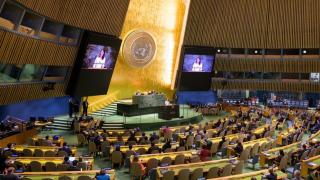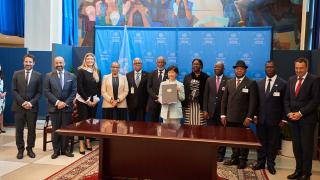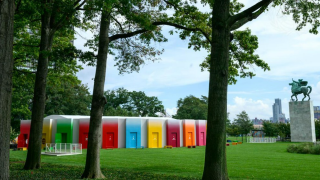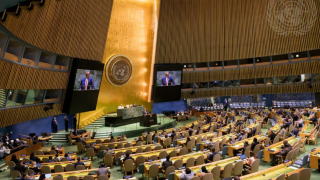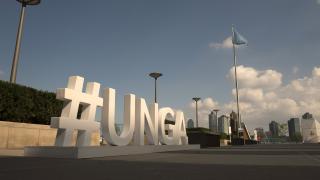
Part of our regular series of background briefings on the UN in the news.
UN member states gather in New York today for the start of the highest profile week of the General Assemby. Find out more with our detailed guide below:
What is UNGA?
The UN General Assembly (UNGA) is one of the main bodies of the United Nations. It is the only UN forum in which all members receive equal representation, and as such it is the main debating chamber of the UN. It is also responsible for the UN’s budget, for the membership of the UN, and for electing and appointing other important roles within the UN, such as the members of the Human Rights Council, the non-permanent members of the UN Security Council and (in principle) the UN Secretary-General.
Unlike resolutions of the Security Council, resolutions of the General Assembly are non-binding on states but, as well as putting the thoughts of the world on record, they can be great motivators for action, particularly within the UN system: commissioning reports, finding funds and establishing offices and processes.
When does the UNGA meet?
The UN General Assembly meetings are divided into annual sessions which start every year in late September. The current session, the 72nd, started on September 12. The sessions then run for almost a year. Indeed, the 71st session has only just finished and UNA-UK’s Laurel Hart reported from one of its meetings just last week.
However, the phrase UNGA is often (incorrectly) used as a synecdoche for the “annual general debate” and sometimes the “high level plenary meeting” that take place in weeks 2 and 3 of the session. Week 2 is often referred to as “UNGA week” because this is when world leaders make speeches. In addition, important announcements and events involving high-profile participants such as CEOs and celebrities are timed to take place during this week – last year’s Summit on Refugees and Migrants is one example. One of the largest meetings of world leaders annually, UNGA week is an important part of the diplomatic calendar, providing ample opportunities for negotiations and discussions in the corridors of UN headquarters.
This UNGA week is the first for new Secretary-General António Guterres, and the first for the host President Trump. This will add to the already disproportionate media attention UNGA week tends to attract, but the real work of UNGA takes place during the rest of the year, and we strive to support journalists and the public in continuing to follow the more substantive developments at the UN throughout the year.
How does the UNGA work?
Three months before the session starts, the General Assembly elects its President, 21 Vice-Presidents and the Chairs of the 6 Main Committees. For this 72nd Session H. E. Mr. Miroslav Lajčák of Slovakia – who stood as a candidate for UN Secretary-General last year – will be the President. In advance of the session the Secretary-General picks a name at random, on this occasion he picked the Czech Republic, and they sit in the “first” seat at the front left of the Assembly. All other countries then sit in alphabetical order following the Czech Republic.
Want to know more? We have produced a detailed guide including sections on:
- A timetable for the first few weeks
- Five things UNGA will discuss
- Five things UNGA should discuss
- Miscellany and contacts
Would you like to print it out? The entire guide is available here in PDF form.
Photo: #UNGA UN Photos

